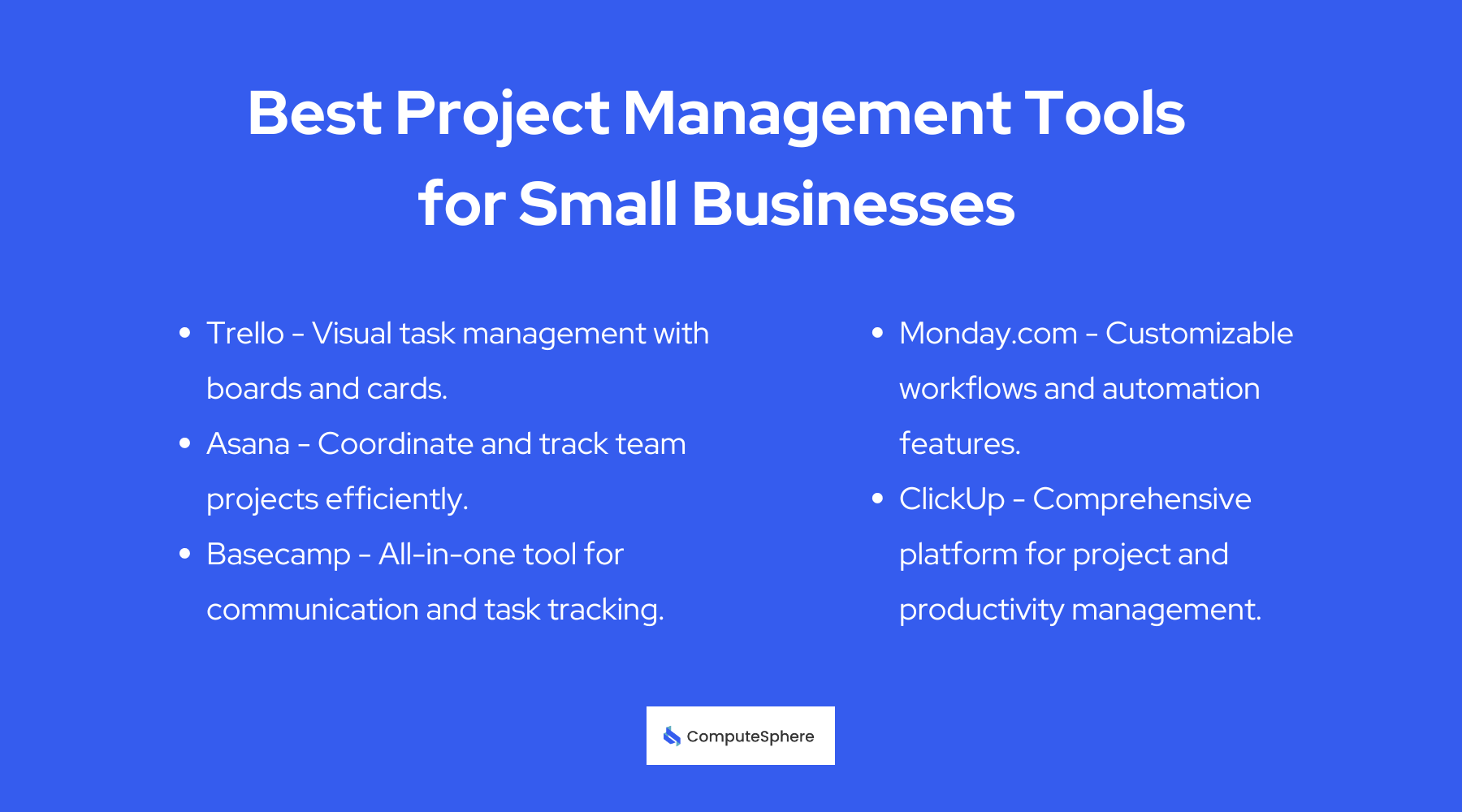Top 5 Project Management Tools for Small Businesses: Streamline Your Workflow

Running a small business often means having multiple responsibilities, from managing teams to overseeing projects and ensuring deadlines are met. Without the right tools, this balancing act can quickly become overwhelming. Project management tools are essential for streamlining tasks, improving communication, and ultimately driving success. These tools are no longer exclusive to large corporations; small businesses can greatly benefit from them too.
We’ll explore the top project management tools that can help small businesses achieve productivity, covering their key features, and benefits to understand which tool might be the best fit for your business needs.
Benefits of Using Project Management Tools
Implementing project management tools in small businesses comes with numerous benefits. First, these tools significantly improve organization by keeping all tasks, documents, and communications in one place. This centralized approach eliminates the confusion and inefficiencies that arise from scattered information. Improved collaboration is another major advantage. Project management tools facilitate better teamwork and communication among team members, ensuring everyone is on the same page and can contribute effectively to the project's success.
Moreover, these tools increase efficiency by automating repetitive tasks and helping track progress to ensure timely completion of projects. Better resource management is also a significant benefit. By improving the allocation and use of resources, these tools prevent bottlenecks and overwork, allowing for smoother project execution.
Lastly, scalability is a key advantage that you get. As your business grows, project management tools can support this growth by adapting to increasing project demands and team size, ensuring that your business continues to run efficiently.
Top 5 Project Management Tools for Small Businesses

1. Trello
Trello is a project management tool that uses boards, lists, and cards to help you organize tasks. Its drag-and-drop interface, customizable boards, checklists, due dates, and attachment features make it highly user-friendly. Trello’s simplicity and visual appeal make it an excellent choice for small teams needing an easy way to manage tasks and projects.
The free tier provides a solid starting point, with the Premium plan available at $10 per user per month, making it suitable for businesses with more advanced needs. While it may lack some advanced features, Trello's ease of use and visual approach make it a popular choice.
2. Asana
Asana is a powerful project management tool that helps teams coordinate and manage their work. It offers task assignments, due dates, project timelines, custom fields, and task dependencies, providing a comprehensive feature set that supports detailed task management and project tracking.
Asana integrates well with other tools, making it a strong option for many businesses. Although it can be overwhelming for new users and has a higher learning curve, its extensive abilities justify the investment. The free tier is available, with premium features starting at $10.99 per user per month and Business at $24.99 per user per month.
3. Basecamp
Basecamp is a project management tool that focuses on simplicity and communication. It includes to-do lists, message boards, schedules, document and file storage, and real-time group chat. Basecamp’s simple interface and strong communication features make it the best choice for small businesses looking for an all-in-one project management and communication tool.
The flat pricing of $99 per month for unlimited users and projects provides excellent value. While it may lack some advanced features and customization options, its simplicity and effectiveness in communication make it a solid option.
4. Monday.com
Monday.com is a flexible platform designed to manage any type of work, from projects to workflows. It features customizable workflows, automation, time tracking, and integrations with popular tools. Monday.com’s highly customizable and visually appealing interface, combined with good automation features, makes it suitable for businesses needing a tailored project management solution.
However, it can be pricey, and its complexity may require a learning curve. Pricing starts at $8 per user per month for the Basic plan, $10 for the Standard, and $16 for the pro plan.
5. ClickUp
ClickUp aims to be an all-in-one productivity platform, combining project management, document management, and goal setting. It offers task management, time tracking, goals, docs, reminders, and an extensive array of integrations.
ClickUp’s feature-rich platform, flexible pricing, and extensive integrations make it perfect for teams requiring a comprehensive tool to manage various types of work. The free tier is best with the Unlimited plan starting at $5 per user per month and the Business plan at $12 per user per month. Though it can be hard to learn, its flexibility and completeness make it a strong choice.
Additional Project Management Tools to Consider
While the top five tools mentioned are excellent choices, there are several other project management tools worth considering. Some of them are;
- Wrike: It has robust best management and collaboration features. It is great for teams needing detailed project tracking and reporting.
- Smartsheet: Combines the flexibility of a spreadsheet with the best project management features.
- Airtable: Highly customizable and great for businesses needing database-style project management.
- Microsoft Project: Comprehensive tool best for detailed project planning and tracking, but can be complex.
- Zoho Projects: Cost-effective and integrates well with other Zoho tools that make it suitable for businesses using Zoho's suite of products.
How to Implement a Project Management Tool in Your Business?
To implement a project management tool, start by understanding your needs and the challenges your business faces. This will help you choose the most suitable tool. Next, customize the tool to fit your workflow, set up projects, and invite team members. Ensure that the tool is configured to support your unique processes and goals.
Training your team is important for the successful adoption that many businesses do not consider. Provide adequate training sessions and resources to ensure everyone understands how to use the tool effectively. Finally, regularly monitor and evaluate the tool’s performance. Gather feedback from your team, track key metrics, and make necessary adjustments to optimize its usage and ensure it continues to meet your business needs.
Conclusion
Project management tools are important for your business if you want to streamline operations, improve collaboration, and achieve your business goals. With a variety of options available, it’s important to choose a tool that best matches your specific business needs and budget. Whether you opt for Trello’s simplicity, Asana’s comprehensive features, Basecamp’s communication focus, Monday.com’s customization, or ClickUp’s all-in-one approach, each tool has unique benefits. Carefully assess your needs, implement the right tool, and bring the ease and productivity that your business longs for time.
Contents
Built for Builders. Priced for Startups.
Tired of unpredictable cloud bills? ComputeSphere offers modular, fixed-cost cloud hosting that grows with your startup—no DevOps headaches, no surprises.
Get StartedShare this article
Browse Some Related Blogs
Relevant and related contents you can read









